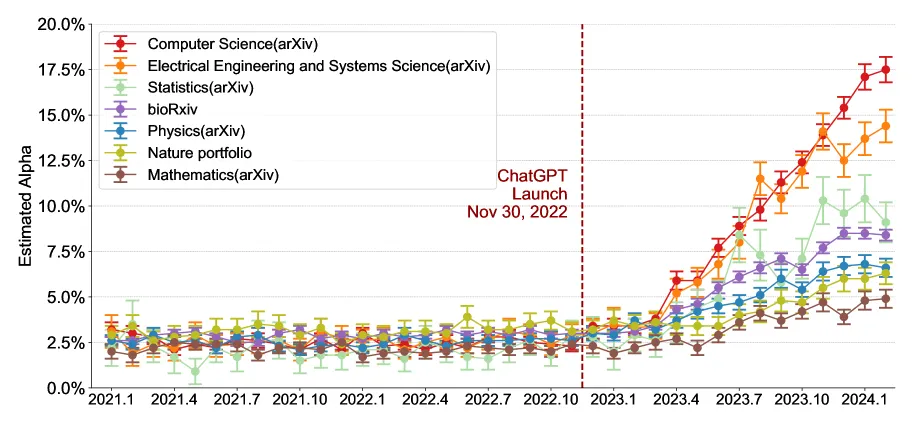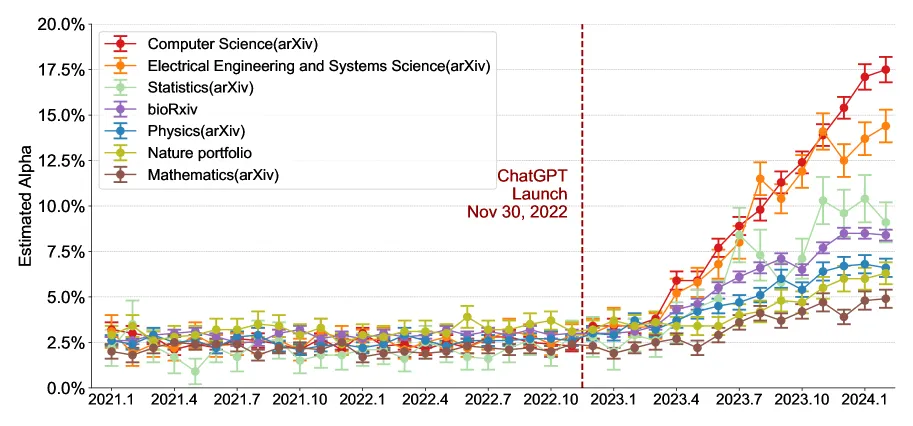In brief
- ArXiv changed its policy after AI tools made it easy to mass-generate survey papers.
- Only peer-reviewed review or position papers will now be accepted in the Computer Science category.
- Researchers are divided, with some warning the rule hurts early-career authors while others call it necessary to stop AI spam.
ArXiv, a free repository founded at Cornell University that has become the go-to hub for thousands of scientists and technologists worldwide to publish early research papers, will no longer accept review articles or position papers in its Computer Science category unless they’ve already passed peer review at a journal or conference.
The policy shift, announced October 31, comes after a “flood” of AI-generated survey papers that moderators describe as “little more than annotated bibliographies.” The repository now receives hundreds of these submissions monthly, up from a small trickle of high-quality reviews historically written by senior researchers.
“In the past few years, arXiv has been flooded with papers,” an official statement on the site explained. “Generative AI/large language models have added to this flood by making papers—especially papers not introducing new research results—fast and easy to write.”
The Computer Science section of @arxiv is now requiring prior peer review for Literature Surveys and Position Papers. Details in a new blog post
— Thomas G. Dietterich (@tdietterich) October 31, 2025
“We were driven to this decision by a big increase in LLM-assisted survey papers,” added Thomas G. Dietterich, an arXiv moderator and former president of the Association for the Advancement of Artificial Intelligence, on X. “We don’t have the moderator resources to examine these submissions and identify the good surveys from the bad ones.”
Research published in Nature Human Behaviour found that nearly a quarter of all computer science abstracts showed evidence of large language model modification by September 2024. A separate study in Science Advances showed that the use of AI in research papers published in 2024 skyrocketed since the launch of ChatGPT.

ArXiv’s volunteer moderators have always filtered submissions for scholarly value and topical relevance, but they don’t conduct peer review. Review articles and position papers were never officially accepted content types, though moderators made exceptions for work from established researchers or scientific societies. That discretionary system broke under the weight of AI-generated submissions.
The platform now handles a submission volume that’s multiplied several times over in recent years, with generative AI making it trivially easy to produce superficial survey papers.
The response from the research community has been mixed. Stephen Casper, an AI safety researcher, raised concerns that the policy might disproportionately affect early-career researchers and those working on ethics and governance topics.
“Review/position papers are disproportionately written by young people, people without access to lots of compute, and people who are not at institutions that have lots of publishing experience,” he wrote in a critique.
Other simply critiqued ArXiv’s stance as wrong (and even dumb), with others even supporting the use of AI to detect AI-generated papers
Thomas, there’s significant push back against arxiv becoming gate keepers, leaning into peer review, and ignoring the problem until it gets worse. Have you considered any of the constructive proposals made by the AI/ML community?
1. Have an unmoderated section of ArXiv (from…
— Justin Angel (@JustinAngel) November 2, 2025
One problem is that AI detection tools have proven unreliable, with high false-positive rates that can unfairly flag legitimate work. On the other hand, a recent study found that researchers failed to identify one-third of ChatGPT-generated medical abstracts as machine-written. The American Association for Cancer Research reported that less than 25% of authors disclosed AI use despite mandatory disclosure policies.
The new requirement means authors must submit documentation of successful peer review, including journal references and DOIs. Workshop reviews won’t meet the standard. ArXiv emphasized that the change affects only the Computer Science category for now, though other sections may adopt similar policies if they face comparable surges in AI-generated submissions.
The move reflects a broader reckoning in academic publishing. Major conferences like CVPR 2025 have implemented policies to desk-reject papers from reviewers flagged for irresponsible conduct. Publishers are grappling with papers that contain obvious AI tells, like one that began, “Certainly, here is a possible introduction for your topic.”
Generally Intelligent Newsletter
A weekly AI journey narrated by Gen, a generative AI model.




